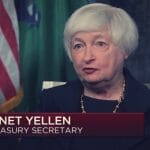Following is the unofficial transcript of a CNBC interview with billionaire investor Mark Cuban on CNBC’s “Squawk Box” (M-F, 6AM-9AM ET) today, Thursday, August 11. Video will be available on CNBC.com.
Interview For Mark Cuban
MELISSA LEE: Mark, you tweeted about the IRA and specifically the tax on stock buybacks and you said this is a terrible idea, first of all, but you said why not make it 2%? What’s your general point here?
Q2 2022 hedge fund letters, conferences and more
MARK CUBAN: No. I’m all for a tax on buybacks. I think people misunderstand the value of buybacks and I think people think they're a better tax advantage option than dividends and that's no longer the case. You know, if somebody holds a stock for, what is it, more than 60 days prior to the exdividend date, it is taxed as long term capital gains. And if you happen to be a shareholder that is below a specific income level – I think it's 75,000 per head of household – then it's tax free. And so the old concept of tax buybacks are more dividend advantaged really doesn't apply to most shareholders. And so I think dividends become a better way of putting money in your shareholders pockets, particularly the shareholders that commit to you.
ANDREW ROSS SORKIN: So Mark, you made sort of a joke on Twitter Inc (NYSE:TWTR) about raising it to 2% and I was a little confused. I was trying to understand – was that a joke or what was that? Is there any policy –
CUBAN: No, no, no, I'm serious. No, no. When I said it was the best of the worst – meaning, you know, no one's a fan of more taxes. But of all the taxes you're trying to create, I think a tax on buybacks is a good idea, actually. So you got misunderstood what my point was. I don't have a problem with buybacks at all. In fact, I think it's a good idea.
SORKIN: So you think maybe I misunderstand this. You think it is a good idea to have the tax on the buyback?
CUBAN: Yeah.
SORKIN: The question I would ask is do you prefer that over the carried interest loophole? Meaning that's effectively what will replace it.
CUBAN: Totally different. Yeah. That's a non sequitur. They're not mutually exclusive, right. You know, I'm not an expert on carry tax. So I'm not really going to comment there. But I think companies have to make decisions, public companies in particular have to make decisions between tax buybacks and – share buybacks rather – and dividends. And a lot of companies seem to believe that the old notion that share buybacks were more tax advantaged for shareholders. That is just not the case any longer. And the reality is for share buybacks, you reward the people who are leaving and selling your stock instead of rewarding the people who are keeping your stock.
SORKIN: What do you make of the argument that now a lot of companies may try to do a lot of buybacks before the end of this year to sort of capture that without the tax and that it may change the way executives are compensated insofar as executives may try to take more cash in part because they can't actually buy back stock both to push up the stock but also to prevent dilution.
CUBAN: I think it's great that they tried to do it all you know, that executives pay themselves more in cash and less in equity.
SORKIN: But that goes to the whole skin in the game thing. Right? Don’t people want skin in the game? Don’t we want them to have skin in the game?
CUBAN: Yeah. What's more skin in the game than the cash coming from your balance sheet?
SORKIN: Well some people would argue that the stock aligns you with the shareholder. I mean, those who are actually against tax buybacks would make that argument.
CUBAN: Yeah. The problem is that it's really easy to financial engineer with stock buybacks, right. There's just so many games that you can play, and it just creates a whole different set of problems. I think the fundamental issue is, do you want to reward your shareholders for staying via dividends and now given the tax consequences? You know, for many the worst case, if it's a long term shareholder, their worst case is a 20% long term capital gains. Their best case, particularly if they're lower income shareholders, is zero tax. And wouldn't you want more people who are typically not shareholders to come in and own the shares of your stock? So if there's somebody out there making $50,000 a year, now you can say to them, look, we're going to start paying dividends. Own our stock, this is a reward for you. And guess what? if you're making under $52,000 a year I think it is as an individual, then it's going to be tax free if you hold our shares. That's pretty darn good. And I think that change has helped people look at shares.
SORKIN: Mark Cuban, it is a longer conversation. We're grateful that you were able to call in this morning. I hope we can continue it. I want to thank you. And I also want to thank Melissa, we're going to turn it over to our friends on “Squawk on the Street.” Make sure you join us tomorrow.













